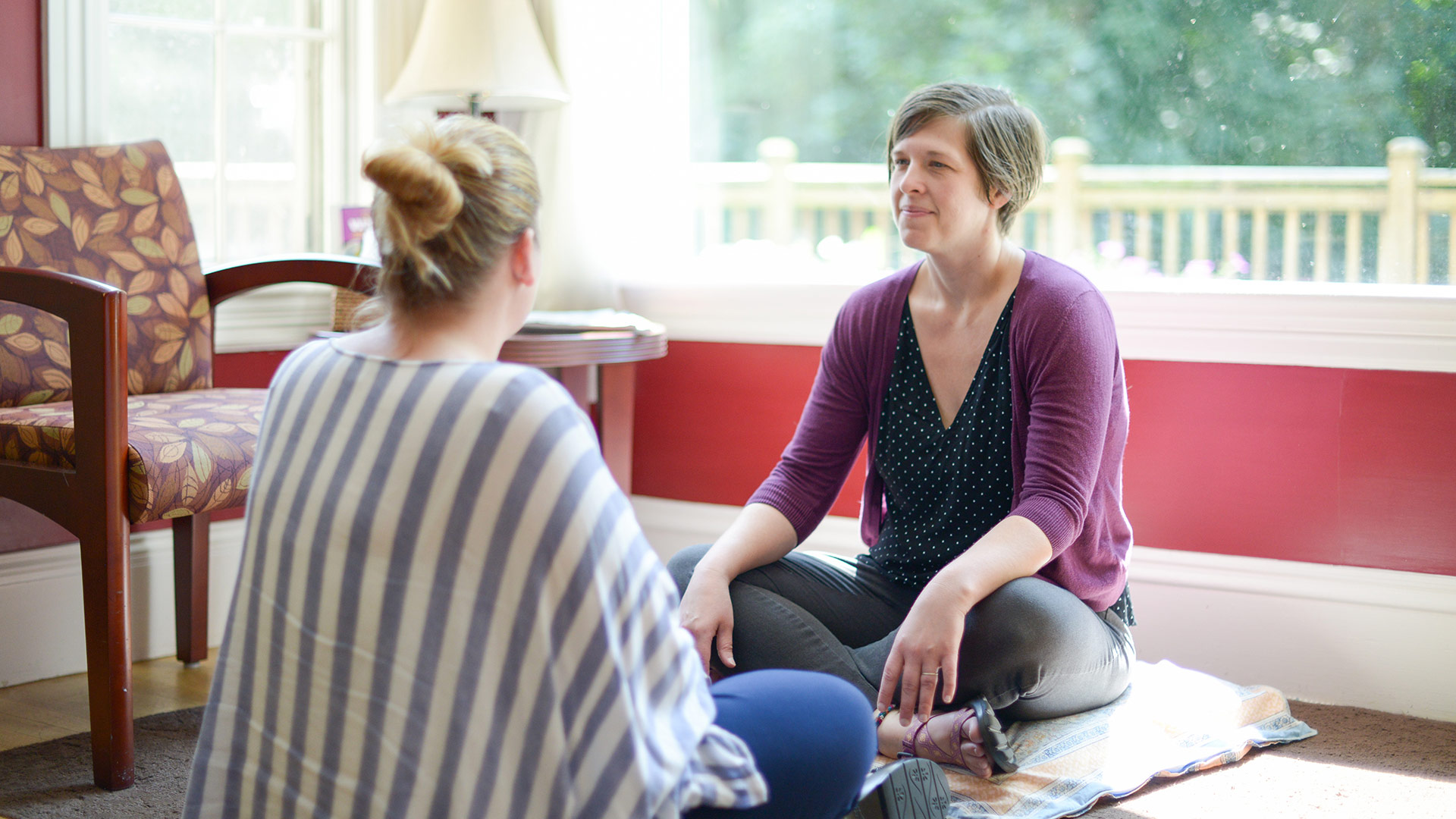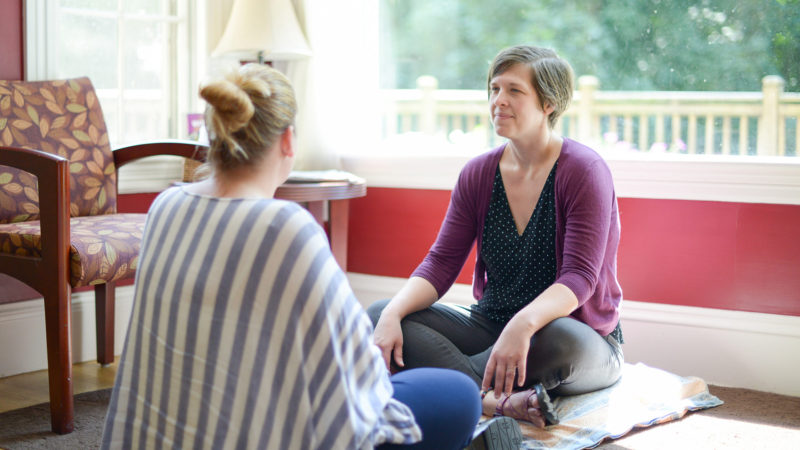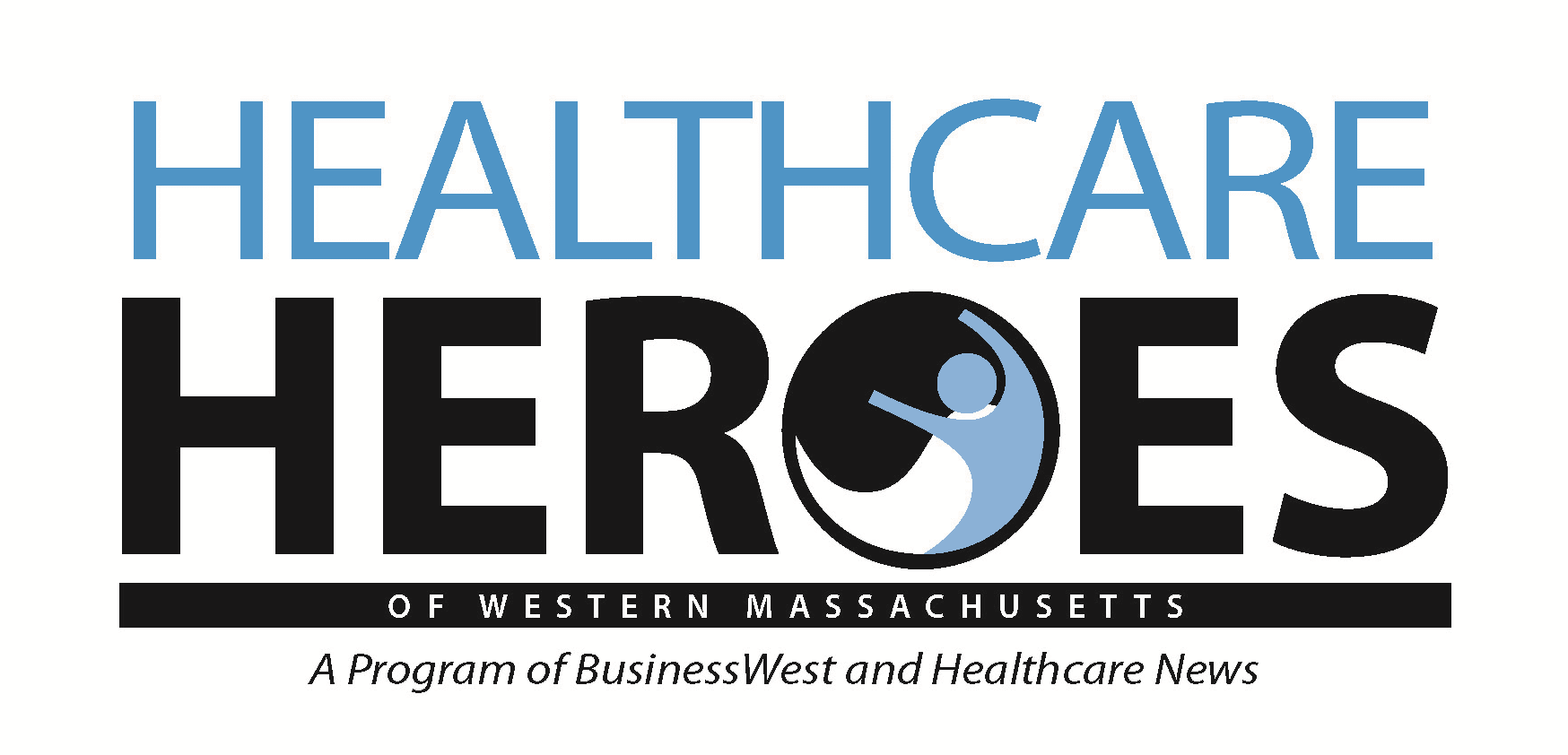Amy Walker
This Nurse Midwife Gave Birth to an Intriguing Concept in Care

‘Accountability.’
After pausing to give the matter some thought, this was the word a woman who chose to be identified only by her initials — S.M. — summoned when asked about what the New Beginnings program at Cooley Dickinson Health Care has given her.
There were other things on that list, to be sure, she said, listing camaraderie, friends, ongoing education, and even role models of a sort. But accountability, on many levels, was what was missing most from her life, and New Beginnings, which supports pregnant women with an opioid-use disorder with education, skills development, peer support, and goal setting, helped her develop some at a time when she needed it most.
“I wanted to come even though I was struggling to stay sober,” she said, referring to the regular group meetings attended by mothers facing similar challenges. “I didn’t have to come, but I wanted to; it’s hard to explain, but it was the beginning of me being responsible and accepting the fact that I was pregnant and here with the other women in the same situation.”
These sentiments speak volumes about why Amy Walker, a certified nurse midwife at Cooley Dickinson Hospital (CDH), created the program in 2018, and also about its overall mission.
“We want to empower women to be successful mothers,” said Walker, whose efforts to create New Beginnings have not only filled a critical need within CDH’s broad service area but earned her the Healthcare Heroes award in the ultra-competitive Community Health category.
She said the foundation of the program is a group approach, which is nothing new when it comes to expectant mothers, but it is new when it comes to this specific at-risk population, which makes New Beginnings somewhat unique and innovative.
“I wanted to come even though I was struggling to stay sober. I didn’t have to come, but I wanted to; it’s hard to explain, but it was the beginning of me being responsible and accepting the fact that I was pregnant and here with the other women in the same situation.”
“There are a couple of other places in the country that are doing this,” she explained. “There’s not a lot of studies on this yet, but it made sense, because it works so well in general and has these added benefits of providing community and more education, that it seemed like the way to go.”
While the program is still in its relative infancy (pun intended), it is already providing some rather dramatic, and measurable, results. Indeed, since the initiative was launched, 10 women with substance-abuse disorders who have participated in the program have delivered at the Childbirth Center at CDH, and nine of the 10 babies went home with their mothers. Walker believes that number would have been much lower had it not been for New Beginnings.
To send more mothers suffering from opioid-abuse disorder home with their babies, New Beginnings provides the many things these women need at this critical, and vulnerable, time in their lives. That list includes what amounts to a support network at a time when family and friends may be unable or unwilling to fill that role.
Indeed, S.M. told BusinessWest that, while her mother was quite supportive during her pregnancy and the period to follow, her friends were still using drugs, and thus, she didn’t want to be around them.
Support is provided in the months and weeks prior to delivery, during delivery, and then during the post-partum period, said Walker, adding that, while post-delivery is a challenging time for most all mothers, it is especially so for those suffering from opioid-abuse disorder.
“The riskiest time for relapse is in the post-partum period,” she explained. “We find that many women are able to maintain sobriety during pregnancy, but of course, the stresses of parenting, and sometimes parenting with limited resources, can be a triggering factor when it comes to relapse.”
The program also provides education and help to mothers with babies diagnosed with neonatal abstinence syndrome (NAS), the incidence of which is growing as the opioid crisis continues, said Walker.
Such babies are fussy, cry a lot, and are hard to soothe, she went on, adding that many remain in the hospital for several weeks. New Beginnings addresses these needs through something called the ‘eat/sleep/console’ method of evaluating and treating newborns with NAS, an initiative that results in shorter hospital stays and less opioid use for the newborn.
Above all else, New Beginnings provides a judgment-free zone that offers both compassion and quality care, said Walker, adding that all three ingredients are needed to properly provide for both mother and baby.
Pregnant Pause
Flashing back to her first New Beginnings group session roughly 16 months ago, S.M. remembers feeling relatively calm, but also a little uneasy about what she was getting herself into.
“I think was kind of numb and a little nervous,” she recalled, adding that she was struggling with sobriety at that time, when she was on methadone. “But at the same time, it felt comforting knowing what it was for; it was for women with addiction problems who were having babies. It was exactly what I needed at that time.”
S.M. said she was referred to New Beginnings several weeks earlier, about three months into her pregnancy and while she was still using heroin, which she described as her “drug of choice.” She said she was experiencing a number of emotions, but mostly anger — directed at herself.
“I was going through a really tough time accepting that I was pregnant,” she told BusinessWest while sitting in the same small room where the group sessions are held. “I couldn’t face the fact that I was using while I was pregnant, because I was really mad at myself. I came here because I wanted to do everything I could to try to do my best and get my life in order.”

In most every case, these emotions, these sentiments, and this particular drug of choice make S.M. typical of a growing number of women who are going through pregnancy while still using opioids or struggling with sobriety, usually through medication-assisted treatment such as methadone or Subutex, said Walker. She added that this growing demographic is an intriguing and sometimes overlooked aspect of the opioid epidemic — one that has now become a focal point of her work as a certified midwife.
And in many ways, this work reflects the values and passions (that’s a word you’ll read often) that brought her to the rewarding profession of midwifery — and will her bring to the podium at the Healthcare Heroes gala on Oct. 17 to accept the award in Community Health.
Our story begins during her undergraduate work when Walker took a job with Planned Parenthood in Gainesville, Fla. She worked at the front desk, selling birth-control pills and checking people in for their appointments.
“I was really inspired to grow in women’s health,” she explained. “I met nurse midwives and nurse practitioners who worked there, and started working in the Health Education department there, doing sex education, HIV-prevention outreach, and more, and from there I decided I wanted to go to midwifery school.”
She would earn her degree at Columbia University and, while doing so, see her career ambitions crystalize.
“My roots were really in gynecological care, but then I developed a love for caring for women and families during pregnancy and birth,” she explained. “I found that I love that intimate connection that you make with families.
“Meanwhile, one of my biggest passions was caring for underserved populations — people who maybe didn’t have access to all the care options,” she went on. “I wanted to provide them with the same type of care as someone who was more able to select what kind of care they wanted; that was really important to me.”
These twin passions have come together in a powerful way with New Beginnings, which Walker conceptualized several years after coming to CDH in 2014 after stints at Leominster Hospital and in St. Croix.
Tracing the origins of the program, she said it was one of many strategic initiatives that sprang from the work of an opioid task force created by CDH in 2016. That group’s work revealed that there were many unmet needs and, overall, that services needed to be better-organized and better-focused.
“I really wanted to be involved with that task force because I felt that the care we were giving to patients with substance-abuse disorders wasn’t really poor care, but it was all over the map,” she told BusinessWest. “There was no consistency in the messages that patients were getting and the education they were getting, and I knew that we could do better.”
One of those many efforts to do better is New Beginnings.
Delivering Results
At the heart of the program and its group sessions is the belief that women going through pregnancy while using opioids or trying to stay sober can benefit from being in the same room together, talking about their experiences, their emotions, their fears, and their hopes for the future.
And S.M.’s story, and her recollections of her year in the program, provide ample evidence that these beliefs are well-founded.
“It was really helpful coming here and knowing that there were other pregnant women who were either going through the same thing or had been there,” she said. “There were other women I’d met through New Beginnings who had kids and had them taken away. That made me feel … I don’t want to say better. It made me feel … well, not as mad at myself, knowing that someone else had been through this and had struggled with being able to have their kids in their life because of their addiction.
“I also came to know the risks of actually having her taken away,” she went on, referring to her daughter, who was playing with other children in the middle of the room as S.M. talked. “And knowing how mad I was just for using, that made me want to just do everything I could.”
These sentiments speak to that goal of empowering women to become successful mothers, said Walker, adding that empowerment comes through accountability and being responsible, but also through education.
And from the start, education has been one of the main focal points for New Beginnings, said Walker, who cited neonatal abstinence syndrome as an example.
“We expect it, and it’s treatable, but it can be challenging, because that baby may need a lot of soothing care, and sometimes needs to be held or soothed or rocked 100% of the time,” she explained. “All this could be challenging for anyone, but if you are someone with your own chronic illness who may not have a lot of support … all those things add up to make it really challenging.
“So if someone was coming into that without having any knowledge of how to care for their baby or what to expect from their hospital stay, that can be really shocking,” she went on. “I felt that we could do a better job of providing that educational prenatally, and there needed to be an avenue for that.”
Elaborating, she said that, typically, most pre-natal visits (for all women) run only about 15 minutes or so. This isn’t much time for women to learn or be supported. In response to this, she created two-hour group prenatal sessions for those involved with New Beginnings. The first hour would be the physical exam, she noted, while the other 90 minutes would be spent providing education and support in a group setting.
“We can cover so many more topics in that amount of time, as opposed to the 15-minute sessions, and you’re also speaking to many patients at a time,” Walker said. “And one of the great things about group prenatal care is that patients are able to hear from other patients and get their perspective.”
As noted earlier, the group sessions can extend to the post-partum period, which, as Walker said, is an extremely vulnerable time for those trying to stay sober.
“What we’re finding statistically is that the biggest risk for relapse is in the six- to 12-months post-partum time,” she noted. “Initially, in the first six months, there’s still a lot of that new-baby glow — even though it’s a hard time, there can still be sweetness. As they get older, it can get more draining; as one patient, who framed it in a good way, told me, ‘the newness wears off.’”
Only a year or so since working with its first participants, New Beginnings is generating measurable results.
Changing Room
S.M. told BusinessWest that the post-partum period was, indeed, a difficult time for her as she worked to keep sober amid the many changes and challenges that came into her life with motherhood.
She said she kept coming to group sessions staged by New Beginnings not because she had to, but because she wanted to — and needed to.
“I was having a hard time, but I just kept holding myself accountable,” she said. “There were days when I wanted to stay home and watch TV, but I made myself come to those meetings.”
She still struggles with being a mother — and with staying sober — but she knows she doesn’t have to face these challenges alone.
And that’s what New Beginnings is all about.
George O’Brien can be reached at obrien@businesswest.com


